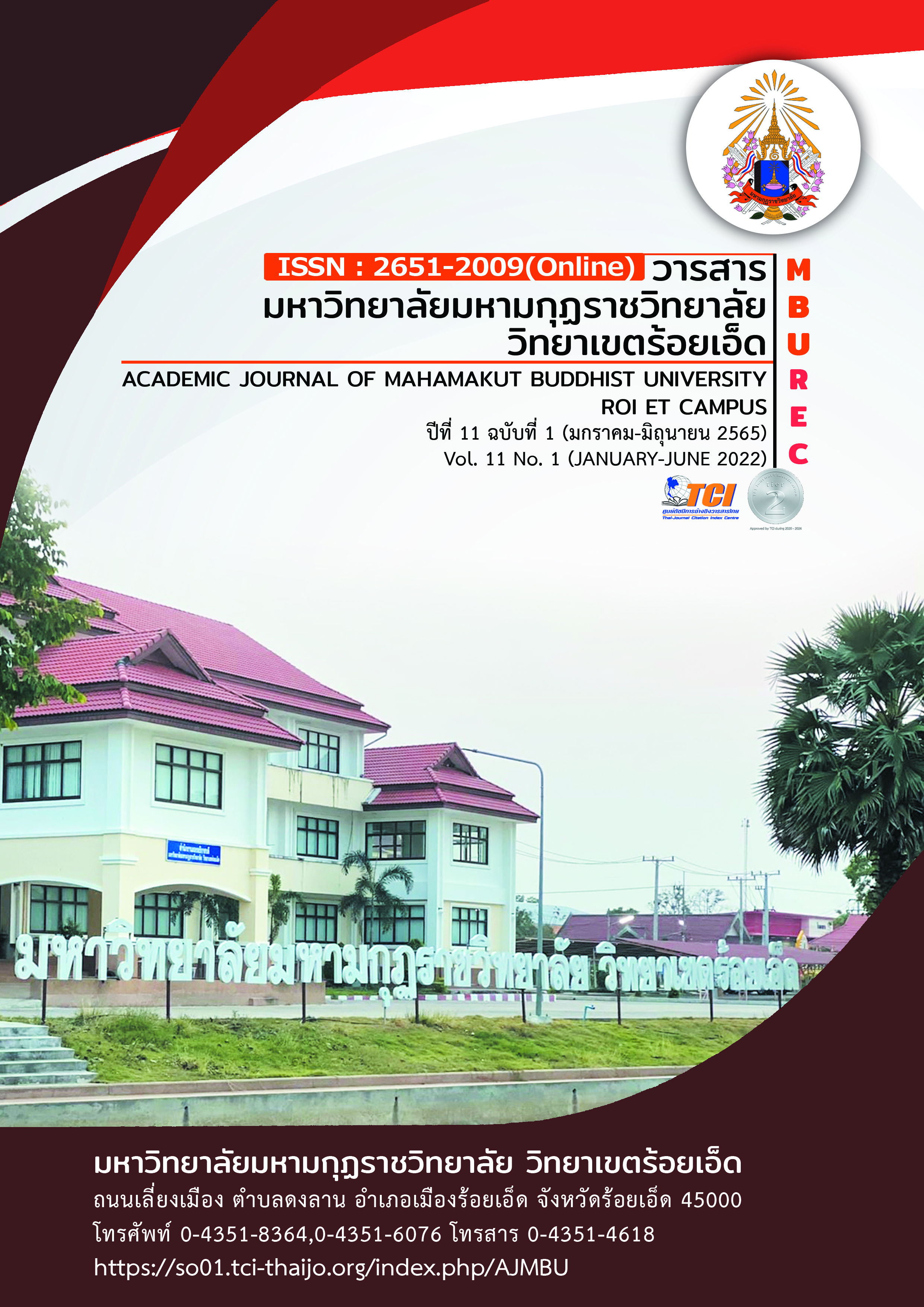THE DEVELOPMENT OF A MODEL FOR STRENGTHENING THE ELDERLY’S ATTRIBUTES AT THE SCHOOL FOR THE ELDERLY PEOPLE SCHOOL BASED ON CONTEMPLATIVE EDUCATION
Main Article Content
Abstract
The objectives of the research article were 1) to study states on the elderly’s attributes to construct a format and develop it for strengthening their attributes, 2) to pursue results of the constructed format, 3) to evaluate the format based on contemplative education. Sample sizes constituted 525 samplers selected through multi-stages adding up to 525 individual. The preceding group comprised one school principal, teachers and the elderly’s representatives. The sampling group on a voluntary basis consisted of 101 elderly students at a contemplative education-based school in Thailand’s north-east region. Research devices comprised: 1) the poll on undertaking the elderly’s school administration, 2) the format for strengthening their attributes, 3) the testing set for measurements of strengthening their attributes, 4) the post-interview set, 5) the questionnaire on their satisfaction, 6) the evaluation form for strengthening their attributes. The statistics used to analyze data comprised percentage, frequency, mean and standard deviation.
The research results were found that: 1. States on undertaking the contemplative education-based school managements were rated at the moderate scale. 2. Essence of strengthening their attributes contained: self-awareness, critical listening, aesthetic dialogues, public mind, and affection and mercy. All the essence was carried through focus groups, evaluation of IOC, and trial. 3. Activity test scores accounted for 81.65 %. In comparison between pretest and posttest scores, those participating in the activities owned higher points with the statistical significance at .05. The format for strengthening their attributes based on contemplative education possessed efficiency at 82.20/81.65. The elderly were satisfied with participating in activities at the highest level. 4) The developed format had their own suitability at the high scale.
Article Details

This work is licensed under a Creative Commons Attribution-NonCommercial-NoDerivatives 4.0 International License.
References
กรมกิจการผู้สูงอายุ. (2553). แผนผู้สูงอายุแห่งชาติ ฉบับที่ 2 (พ.ศ. 2545-2564) ฉบับปรับปรุงครั้งที่ 1 พ.ศ. 2552. สืบค้นเมื่อ 1 สิงหาคม 2562. จาก https://www.dop.go.th/ download/ laws/law_th_20152309144546_1.pdf
กุลยา ตันติผลาชีวะ. (2553). การสอนแบบจิติปัญญา แนวการใช้ในการสร้างแผนการสอนระดับอนุบาลศึกษา. กรุงเทพมหานคร : เอดิสิน เพลสโปรดักส์.
ทิศนา แขมมณี. (2553). ศาสตร์การสอน : องค์ความรู้เพื่อการจัดการกระบวนการเรียนรู้ที่มีประสิทธิภาพ. พิมพ์ครั้งที่ 2. กรุงเทพมหานคร : โรงพิมพ์แห่งจุฬาลงกรณ์มหาวิทยาลัย.
ธนา นิลชัยโกวิทย์. (2551). “การเรียนรู้เพื่อการเปลี่ยนแปลงและจิตตปัญญาศึกษา” จิตตปัญญาศึกษา : การศึกษาเพื่อการพัฒนามนุษย์. พิมพ์ครั้งที่ 2. นครปฐม : มหาวิทยาลัยมหิดล.
บุญเลี้ยง ทุมทอง. (2556). ทฤษฎีและการพัฒนารูปแบบการจัดการเรียนรู้. กรุงเทพมหานคร : โรงพิมพ์เอสพริ้นติ้ง ไทย แฟคตอรี่.
พระพรหมคุณาภรณ์ (ป.อ.ปยุตฺโต). (2549). สุขภาวะองค์รวมแนวพุทธ. พิมพ์ครั้งที่ 10. นนทบุรี : กองการแพทย์ทางเลือกกรมพัฒนาการแพทย์แผนไทยและการแพทย์ทางเลือก กระทรวงสาธารณสุข.
พระมหาไชยา หัดประกอบ. (2560). การพัฒนารูปแบบการจัดการศึกษาตลอดชีวิตให้กับผู้สูงอายุโดยใช้วัดเป็นฐาน. วิทยานิพนธ์การศึกษาดุษฎีบัณฑิต. มหาวิทยาลัยศรีนครินทรวิโรฒ.
พิชชาดา สุทธิแป้น. (2559). การวิจัยและพัฒนาโปรแกรมการจัดการตนเองที่มีต่อพฤติกรรมการดำเนินชีวิตอย่างมีสุขภาวะที่ดีและผลลัพธ์สุขภาพ สำหรับผู้สูงอายุที่มีความดันโลหิตสูง. วิทยานิพนธ์ปรัชญาดุษฎีบัณฑิต. มหาวิทยาลัยศรีนครินทรวิโรฒ.
พิมพ์ใจ ทายะติ. (2560). รูปแบบการจัดการเรียนรู้สำหรับผู้สูงอายุประเทศไทยเพื่อการรู้เท่าทันเทคโนโลยีสารสนเทศและการสื่อสาร. วิทยานิพนธ์การศึกษาดุษฎีบัณฑิต. มหาวิทยาลัยศรีนครินทรวิโรฒ.
มูลนิธิสถาบันวิจัยและพัฒนาผู้สูงอายุไทย. (2553). สถานการณ์ผู้สูงอายุไทย พ.ศ. 2552. กรุงเทพมหานคร : บริษัททีคิวพี จำกัด.
มูลนิธิสถาบันวิจัยและพัฒนาผู้สูงอายุไทย. (2559). สถานการณ์ผู้สูงอายุไทย พ.ศ. 2558. กรุงเทพมหานคร : อมรินทร์พริ้นติ้งแอนด์พับลิชชิ่ง จำกัด (มหาชน).
ราชบัณฑิตยสถาน. (2551). พจนานุกรมศัพท์ศึกษาศาสตร์ ฉบับราชบัณฑิตยสถาน. กรุงเทพมหานคร :ราชบัณฑิตยสถาน.
ศูนย์ส่งเสริมและพัฒนาพลังแผ่นดินเชิงคุณธรรม(ศูนย์คุณธรรม). (2551). การสังเคราะห์งานวิจัยเกี่ยวกับคุณธรรมในประเทศและต่างประเทศ. กรุงเทพมหานคร : พริกหวานกราฟฟิก.
สุปราณี ศรีฉัตราภิมุข. (2558). ยุทธศาสตร์การพัฒนาคุณภาพจิทิตและการเรียนรู้ของคนพิการ ผู้สูงอายุ และผู้ด้อยโอกาสในยุคการหลอมรวมเทคโนโลยี. กรุงเทพมหานคร : สถาบันวิจัยและให้คำปรึกษาแห่งมหาวิทยาลัยธรรมศาสตร์.
สุปรียส์ กาญจน์พิศศาล. (2562). เอกสารประกอบการสอนรายวิชา จศจศ 528 แนวคิดชีวิตและความตาย. นครปฐม : จิตตปัญญาศึกษา มหาวิทยาลัยมหิดล.
Battistich; et al. (1997). Caring school communities. Educational Psychologist. 32(2). 137-151.


